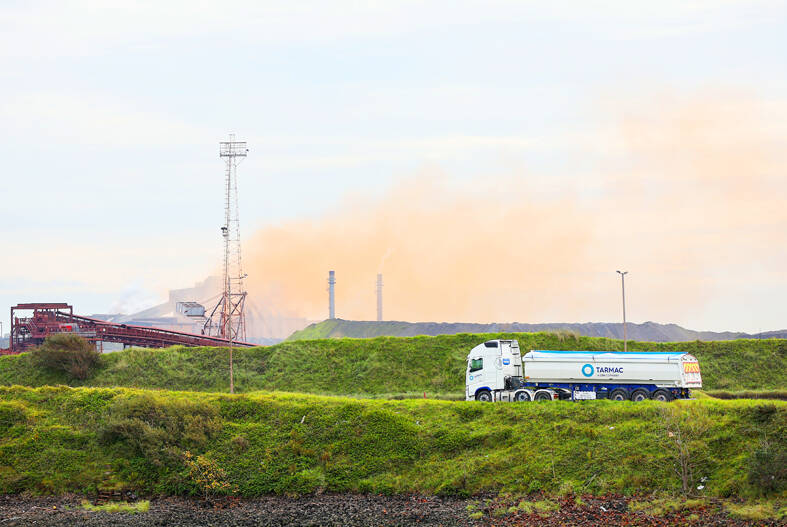The British government yesterday said that it would implement a new import carbon pricing mechanism by 2027, with goods imported from countries with a lower or no carbon price having to pay a levy as part of decarbonization efforts.
The UK government said the carbon border adjustment mechanism (CBAM) would apply to carbon-intensive products in the iron, steel, aluminum, fertilizer, hydrogen, ceramics, glass and cement sectors.
The charge applied would depend on the amount of carbon emitted in the production of the imported good, and the gap between the carbon price applied in the country of origin — if any — and the carbon price faced by UK producers.

Photo: EPA-EFE, Adam Vaughan
“This levy will make sure carbon-intensive products from overseas — like steel and ceramics — face a comparable carbon price to those produced in the UK, so that our decarbonization efforts translate into reductions in global emissions,” British Chancellor of the Exchequer Jeremy Hunt said. “This should give UK industry the confidence to invest in decarbonization as the world transitions to net zero.”
The British government said it would help reduce the risk of “carbon leakage,” avoiding emissions being displaced to other countries due to them having a lower or no carbon price. The CBAM will work alongside the UK Emissions Trading Scheme, it added.
In September, the EU launched the first phase of a system to impose carbon dioxide emissions tariffs on imported steel, cement and other goods — the world’s first. It would not begin collecting any carbon dioxide emission charges at the border until 2026.
That planned tariff has caused disquiet among trading partners and at a recent forum, Chinse Special Envoy on Climate Change Xie Zhenhua (解振華) urged countries not to resort to unilateral measures such as the EU levy.
The UK Treasury said the design of its carbon border tax would be subject to further consultation next year, including the list of products in scope.

Taiwan Semiconductor Manufacturing Co (TSMC, 台積電) would not produce its most advanced technologies in the US next year, Minister of Economic Affairs J.W. Kuo (郭智輝) said yesterday. Kuo made the comment during an appearance at the legislature, hours after the chipmaker announced that it would invest an additional US$100 billion to expand its manufacturing operations in the US. Asked by Taiwan People’s Party Legislator-at-large Chang Chi-kai (張啟楷) if TSMC would allow its most advanced technologies, the yet-to-be-released 2-nanometer and 1.6-nanometer processes, to go to the US in the near term, Kuo denied it. TSMC recently opened its first US factory, which produces 4-nanometer

PROTECTION: The investigation, which takes aim at exporters such as Canada, Germany and Brazil, came days after Trump unveiled tariff hikes on steel and aluminum products US President Donald Trump on Saturday ordered a probe into potential tariffs on lumber imports — a move threatening to stoke trade tensions — while also pushing for a domestic supply boost. Trump signed an executive order instructing US Secretary of Commerce Howard Lutnick to begin an investigation “to determine the effects on the national security of imports of timber, lumber and their derivative products.” The study might result in new tariffs being imposed, which would pile on top of existing levies. The investigation takes aim at exporters like Canada, Germany and Brazil, with White House officials earlier accusing these economies of

GREAT SUCCESS: Republican Senator Todd Young expressed surprise at Trump’s comments and said he expects the administration to keep the program running US lawmakers who helped secure billions of dollars in subsidies for domestic semiconductor manufacturing rejected US President Donald Trump’s call to revoke the 2022 CHIPS and Science Act, signaling that any repeal effort in the US Congress would fall short. US Senate Minority Leader Chuck Schumer, who negotiated the law, on Wednesday said that Trump’s demand would fail, while a top Republican proponent, US Senator Todd Young, expressed surprise at the president’s comments and said he expects the administration to keep the program running. The CHIPS Act is “essential for America leading the world in tech, leading the world in AI [artificial

REACTIONS: While most analysts were positive about TSMC’s investment, one said the US expansion could disrupt the company’s supply-demand balance Taiwan Semiconductor Manufacturing Co’s (TSMC, 台積電) new US$100 billion investment in the US would exert a positive effect on the chipmaker’s revenue in the medium term on the back of booming artificial intelligence (AI) chip demand from US chip designers, an International Data Corp (IDC) analyst said yesterday. “This is good for TSMC in terms of business expansion, as its major clients for advanced chips are US chip designers,” IDC senior semiconductor research manager Galen Zeng (曾冠瑋) said by telephone yesterday. “Besides, those US companies all consider supply chain resilience a business imperative,” Zeng said. That meant local supply would